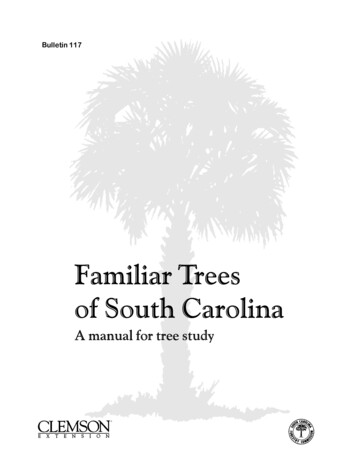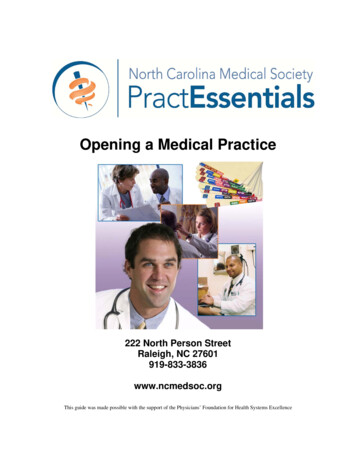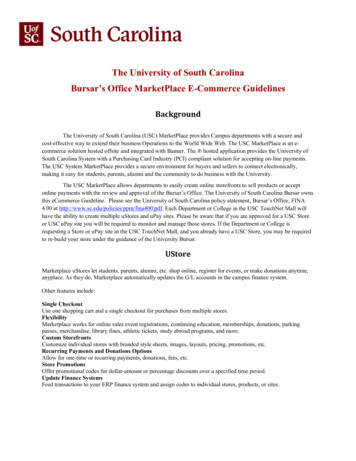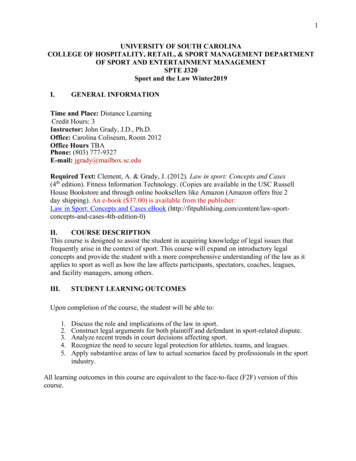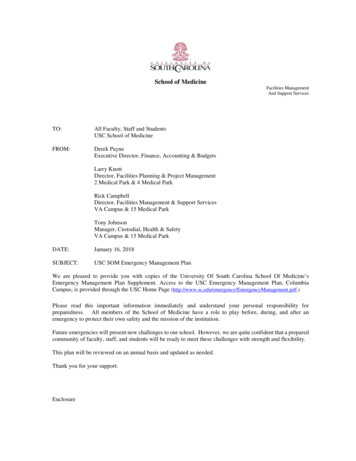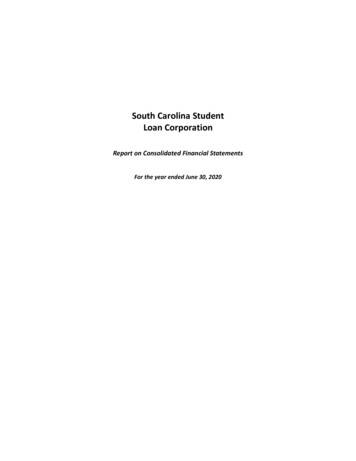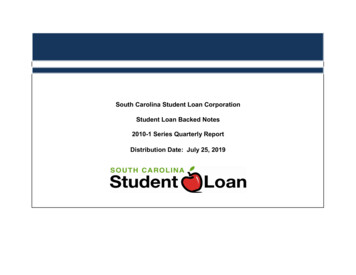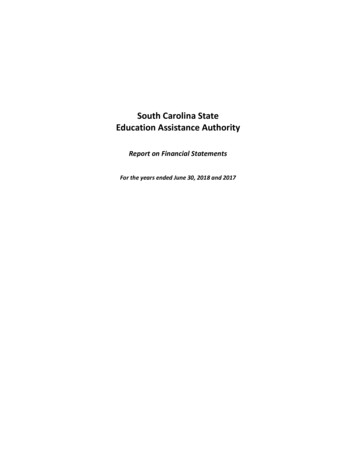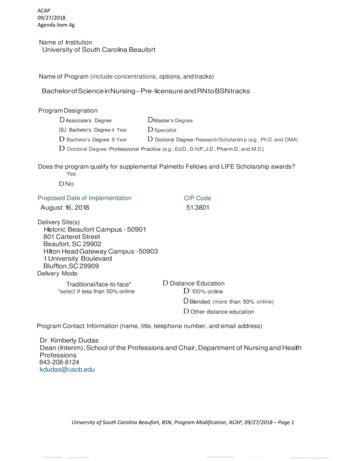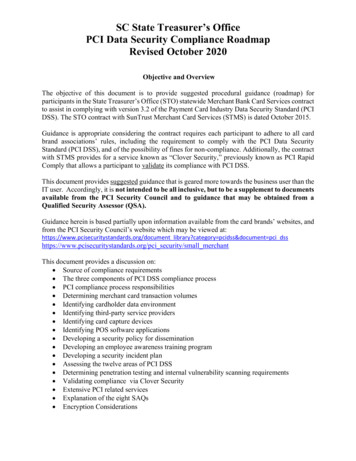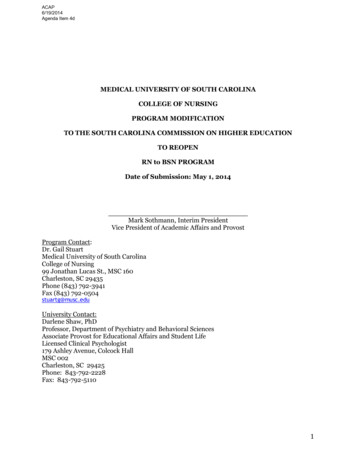
Transcription
ACAP6/19/2014Agenda Item 4dMEDICAL UNIVERSITY OF SOUTH CAROLINACOLLEGE OF NURSINGPROGRAM MODIFICATIONTO THE SOUTH CAROLINA COMMISSION ON HIGHER EDUCATIONTO REOPENRN to BSN PROGRAMDate of Submission: May 1, 2014Mark Sothmann, Interim PresidentVice President of Academic Affairs and ProvostProgram Contact:Dr. Gail StuartMedical University of South CarolinaCollege of Nursing99 Jonathan Lucas St., MSC 160Charleston, SC 29435Phone (843) 792-3941Fax (843) 792-0504stuartg@musc.eduUniversity Contact:Darlene Shaw, PhDProfessor, Department of Psychiatry and Behavioral SciencesAssociate Provost for Educational Affairs and Student LifeLicensed Clinical Psychologist179 Ashley Avenue, Colcock HallMSC 002Charleston, SC 29425Phone: 843-792-2228Fax: 843-792-51101
ACAP6/19/2014Agenda Item 4d2. ClassificationProgram Title: Bachelor of Science in NursingConcentration/options/track: RN – BSNAcademic Unit in which the program resides: College of NursingDesignation, type and level of degree: Bachelor of Science in Nursing (BSN)Program Length: One-year program (3 semesters)Proposed Date of Implementation: August 2014Current CIP: 513801Program Identification: ModifiedSite: Medical University of South Carolina, Charleston, South CarolinaScholarship: In most situations students will not qualify for the Palmetto Fellow or LIFEscholarships.Delivery Mode: Online course, with required clinical3. Institutional Approval1. College of Nursing Faculty Assembly: March 17, 20142. Deans Meeting: March 17, 20143. Vice Presidents' Council: March 19, 20144. Board of Trustees: April 11, 20144. Program Purpose and Long Range GoalsDescription: The RN-to-BSN (RN-BSN) program will be a modification of the currentAccelerated BSN program at the Medical University of South Carolina (MUSC) College ofNursing (CON). This will be a three continuous semester online program for registered nurses(RN) who are graduates of an accredited associate degree or diploma program in nursing and itwill lead to the Bachelor of Science degree in Nursing. The program will have a yearly fall startdate and will be full time. This proposed modification would allow registered nurses to enter theBSN program after meeting required prerequisites. The program will utilize existing courses inthe current accelerated BSN program and add new courses to meet the needs of working, adultnurses. The curriculum has been modified and is designed to attract the working professionalwho has already passed NCLEX and who now plans to obtain a BSN degree. Students will workonline, asynchronously to obtain education while accommodating their RN work shifts. Intensecourses based on adult learning theories will be offered in 5-week blocks over the semester. Theprogram focuses on the knowledge, skills and values deemed essential for professional nursingpractice with a specific focus on leadership, care coordination and communication skills. Thebaccalaureate program also provides a foundation for graduate study in nursing. The clinicalcourses focusing on gerontology, community/public health, and leadership/qualityimprovement will span the entire semester. The program is designed to meet the AmericanAssociation of Colleges of Nursing (AACN) “Essentials of Baccalaureate Education forProfessional Nursing Practice (2008).”1 In addition, the following professional nursingstandards and guidelines will be used: Code of Ethics for Nurses With Interpretive Statements (American Nurses Association,2001) Nursing: Scope and Standards of Practice (American Nurses Association, 2004) Nursing's Social Policy Statement (American Nurses Association, 2003) R.91-11-C. Department of Labor, Licensing and Regulation--State Board of Nursing.Nursing education programs. Faculty. South Carolina Code of Regulations (SouthCarolina General Assembly, 2008)Purpose and Goals: The purpose of this RN-BSN program is to prepare graduates forprofessional nursing roles such as care coordinators, clinical leaders, applicants for graduate2
ACAP6/19/2014Agenda Item 4dstudy, and contributors to interprofessional healthcare teams. The overall goals are to educateprofessionals to integrate evidence-based clinical knowledge and research with effectivecommunication and leadership skills in order to translate best clinical practice into care ofindividual patients, families, communities, and populations. Nurses educated at thebaccalaureate level have been shown to enhance patient outcomes.Program Outcomes: Graduates will demonstrate the following:1. Overall satisfaction with their educational experience.2. Knowledge, skills, and abilities to provide leadership, evidence-based care, and patientsafety to achieve quality outcomes in patient care.3. Competence in care coordination and facilitation of access to resources across thecontinuum of healthcare environments in order to meet the evolving healthcare needs ofindividuals, families, communities, and populations.4. Effective interprofessional communication and shared decision-making in applyingprinciples of systems and organizational processes to promote quality care and patientsafety.Job Opportunities: The Bureau of Labor Statistics (BLS) in 2012 identified registerednursing as one of the leading occupations in terms of job growth through 2020.2 They projecteda growth of 19% from 2012 to 2022, faster than the average for all occupations. The BLS projectsa need for 1.2 million nurses to fill new positions ( 500,000) and replace a retiring workforceover the next eight years.2 Although nurses entering the RN-BSN program already hold jobs inthe nursing field, they are often unable to seek promotion without a baccalaureate degree. Inaddition, there is growing evidence that facilities with a large proportion of baccalaureateprepared nurses have better patient outcomes, including reduced morbidity and mortality.National and South Carolina Data: According to the American Association of Colleges ofNursing (AACN), registered nurses are recognizing the need to get a baccalaureate degree, andmany employers are providing funding and support to assist them.3 Enrollment into RN-BSNprograms has increased by 15.5% and continues to grow.4 There are 692 current programs atthe state and national level, with approximately 400 of these at least partially online; however,they cannot meet the needs of those hoping to return to school. According to AACN, close to3,000 RN-BSN students are turned away from programs each year. 3 There are currently 11 RNBSN programs in the state of South Carolina but only 5 of them are online programs. Registerednurses who wish to obtain their bachelors degree may not be able to attend traditionalclassroom education. The need for online education in the state is critical. Every year the SouthCarolina Department of Commerce and the federal BLS collaborate to estimate the futureemployment levels for many healthcare occupations including nursing. In the state of SouthCarolina the number one occupation that is expected to grow the fastest is Registered Nursing. 5South Carolina anticipates a 25% increase in jobs for registered nurses between 2008-2018 withaverage annual job openings totaling 1,633.5 In addition to this, 33,445 nurses in the state ofSouth Carolina do not hold baccalaureate degrees. This is 59% of the 64,800 registered nurseworkforce in the State. It is essential that we increase the educational programs in SouthCarolina to not only meet the needs of these nurses, but to achieve the goals of the Institute ofMedicine’s (IOM) landmark report “The Future of Nursing: Leading Change, AdvancingHealth,” which called for increasing the number of baccalaureate-prepared nurses in theworkforce to 80% by 2020.6 The Tri-Council for Nursing, including the AACN, AmericanNurses Association, American Organization of Nurse Executives, and the National League forNursing have all stated that a more highly educated nursing workforce is critical to meeting thenation’s nursing needs and delivering safe, effective patient care.7 The Tri-Council has issued aconsensus statement calling for all registered nurses to advance their education. The RN-BSN3
ACAP6/19/2014Agenda Item 4dprogram at MUSC will complement the current programs and will help South Carolina meet thisgoal.5. Justification for the ProgramNeed and Rationale: The American Nurses Association (ANA) first recommended thebaccalaureate degree as the “minimum preparation for the beginning professional nursingpractice” in 1965. Although there are still numerous entries into the nursing field includingLPN, ADN and diploma programs, it is becoming evident that the BSN should be the requiredentry-level degree. Healthcare has becoming increasingly complex and healthcare organizations,as well as the federal government, are calling for BSN-prepared nurses. BSN-prepared nursesare better equipped to meet the demands of practice. In 2008, the ANA passed a resolutionwhich recommended that all RNs who graduate from an ADN or diploma program be requiredto earn a BSN within 10 years of graduation.In 2013, the IOM released a study of nursing and healthcare, “The Future of Nursing:Leading Change, Advancing Health.”6 It addressed the need to prepare a nursing workforce thatis adept at critical thinking and the use of research and best evidence. Patients are older, sickerand more diverse, and nurses are expected to work more independently toward activelypromoting health and the well being of a population. The report addressed the corecompetencies of nurses to include leadership, health policy, systems improvement, research andevidence-based practice, teamwork and collaboration, and technological knowledge. In addition,they must have competency in specific areas such as community health, public health, andgeriatrics. The IOM report provided clear directives to advance the formal education ofregistered nurses and recommended that the proportion of nurses with baccalaureate degreesincrease to 80% by 2020.6ADN, diploma and BSN nurses all sit for the same licensing examination and are held tothe same professional standards; however, there is a strong movement in this country to havethe BSN as entry into practice. The American Association of Colleges of Nursing (AACN)recognizes the BSN degree as “the minimum educational requirement for professional nursingpractice” and states that the BSN degree is essential for nurses seeking to perform at theleadership level. They also state that the BSN-prepared nurse is the only basic nursing graduateprepared to practice in multiple healthcare settings such as critical care, ambulatory care, andpublic and mental health. The AACN reported that there was a 15.5% increase in the enrollmentof nurses in RN-BSN programs from 2010-2011 and this marked the tenth year of increases.4The AACN reported that 52,922 students graduated from BSN entry programs in 2011 and24,311 graduated from BSN completion programs.8 Quality patient care hinges on having ahighly educated nursing workforce, and to do this, South Carolina needs to be able to provideeducation to 59% of the current workforce that does not hold a BSN degree. In a recent studysurveying RN-BSN programs they found that 46% of these programs admitted less than 50students and 53% graduated fewer than 24 students a year.9 In order to ensure that all nurseshave BSN degrees, it is essential that we open programs to meet the growing demand.The National Advisory Council on Nurse Education and Practice (NACNEP) alsosupports the BSN as the minimum for entry into practice. This organization reports to the U.S.Congress and the U.S. Secretary for Health and Human Services on nursing issues and hasasked for the U.S Congress, Department of Health and Human Services, and the Department ofEducation to work with nursing programs to reach this goal. They state that this would improvethe quality and safety of healthcare in the United States. They call for nurse educators to“evaluate and revise education curricula, approaches, and programs used to educate new andpracticing nurses”.10 MUSC's proposed RN-BSN program addresses a need not only in the Statebut nationally.Studies have demonstrated that BSN-prepared nurses are associated with decreasedpatient mortality. A new study in “The Lancet” found that patients with complications post-4
ACAP6/19/2014Agenda Item 4dsurgery are more likely to live if they are cared for in hospitals with adequate staffing levels andhigher numbers of BSN-prepared nurses. They found that a “10% increase in the proportion ofnurses holding a BSN in an acute care setting is associated with a 7% decrease in the risk ofdeath in discharged patients following common surgeries such as knee replacements,appendectomies and vascular procedures.”11 The American Association of Colleges of Nursing(AACN) recently stated that this article adds to the growing body of evidence that quality patientcare requires a well-educated nursing workforce. 12 In addition, the U.S. Congress, the U.S.Department of Health, and Human Services and the U.S. Department of Education are beingasked to “work with U.S. nursing programs to support the goal of having all registered nursesprepared at the baccalaureate in nursing (BSN) or higher degree level to improve quality andsafety” of care in the United States.10To ensure the RN workforce achieves baccalaureate or higher degrees by 2020, collegesmust become part of the innovative solutions that will develop the future generations of nurses.The Medical University of South Carolina Hospital Authority (MUHA) is just one of hundredsaround the country that have started to require that their nurses have at least a baccalaureatedegree in nursing. NACNEP recommends that Colleges of Nursing work with healthcareproviders to close the gap between practice and education for nurses and to improve safety andquality of care for patients.10 The MUSC CON has worked closely with MUHA in the currentBSN program, and the RN-BSN program will further this collaboration.The Medical University of South Carolina (MUSC) College of Nursing (CON) is openingthe RN to BSN program with the encouragement and full support from MUHA as well as otherhospitals in the region to raise the education level of the RN workforce. The goal in providingthis higher-level education is to enhance both the clinical competency and the care delivered toimprove the quality of care that all patients receive. MUHA currently has 800 nurses withoutbaccalaureate degrees. MUHA has put a plan into place to ensure BSN education for all of theirnurses in the next four years and has asked the CON to work with them to help meet this goal.Qualified MUHA nurses will have priority admission into the program during the first two years.Centrality to the Commission-Approved Mission of the Institution: The College ofNursing (CON) supports the mission of MUSC and is committed to providing evidence-basednurse education in an interprofessional environment; developing, testing, and disseminatingnursing knowledge in the health sciences; and demonstrating excellence in nursing practice thatembraces equity and culturally-effective care to patients, families, and communities. The CON’smission was revised and updated in July 2013. The MUSC College of Nursing’s educationalprograms aim to prepare professional nurses who are leaders at all educational levels to practicenursing in a dynamic, interprofessional healthcare environment.The curriculum prepares nurses who will practice nursing at the baccalaureate clinical level.The existing BSN program has a non-degree entry option for those without nursing degrees,who have met the prerequisites for the program. With the proposed modification, a secondentry point will be offered to nurses who have passed the NCLEX exam who wish to return fortheir baccalaureate degree. The curriculum is designed to meet the overall mission of the CON.The programs will share common courses and have unique courses that are fast paced. This newRN-BSN curriculum, like the current BSN curriculum, is carefully designed and embodiesMUSC’s and the CON’s mission by unifying education, research, and clinical practice.6. EnrollmentAdmission Criteria: Table 1 outlines the required prerequisites that students must takefor entry into the program. In addition to this, students will receive 30 credit hours if they areregistered nurses who have successfully passed the NCLEX exam, demonstrating competency intheir RN education. The preferred minimum cumulative Grade Point Average (GPA) will be a3.0 on a 4.0 scale. Students must earn a minimum grade of “C” in prerequisite courses. Coursework may be in progress at the time of application, but must be completed by the initial date of5
ACAP6/19/2014Agenda Item 4denrollment. Three of the four required science courses must be completed at the time ofapplication. Applicants will be required to submit official transcripts, three (3) satisfactoryreference forms, a one hundred (100) word essay, and a resume with the application.Table 1: Prerequisite CoursesSemester HoursEnglish Composition/Literature6 shLifespan Human Growth and Development3 shHuman Anatomy4 shHuman Physiology4 shMicrobiology4 shStatistics3 shScience elective4 shSocial Science and Humanities electives15 shGeneral electives17 shTotal:60 shProjected Enrollment in the First Five Years: This proposed modification would increasestudent enrollment in the CON by 30 in the first year with the ability to increase beyond that aswe expand the program to the community and the State. The goal would be to increase studentenrollment by 60 students in the BSN program over the next 4 years. Currently the CON has 180BSN students enrolled and admits 80 students into the BSN program twice a year. This wouldincrease our total BSN numbers to 210 in year one and up to 240 by year four. Table 2 estimatesnew enrollment over the next five years for the RN-BSN 18-2019Table 2: ESTIMATED NEW ENROLLMENTFALLSPRINGSUMMERHeadcount CreditHeadcount CreditHeadcount 9601360960960136096097. CurriculumCurriculum Changes and Program of Study: Table 3 outlines the curriculum. The currentundergraduate BSN program offers two online courses, Health Systems and Policy (NURSU372) and Leadership and Management in Nursing (NURSU 376) but is mostly offered in atraditional classroom environment. The RN-BSN program will be a fully online program. TheCON utilizes the Moodle Environment to manage the learning component. The followingcourses in the current BSN program will be offered intensely over shorter time frames for adultlearners: NURSU 315 W01; NURSU 464 W01; NURSU 372 W01 and NURSU 376 W01. Theremainder of the courses will be designed specifically to meet the needs of experienced nurses toensure we meet the AACN “Essentials of Baccalaureate Education for Professional NursingPractice (2008)”.6 The nursing courses are varied during the program being 5 weeks in lengthfor all didactic courses and 10-15 weeks in length for clinical courses. Each semester there is one6
ACAP6/19/2014Agenda Item 4dclinical course with a focus on one of the following: gerontology, community/public health, orleadership/quality improvement that extends over longer periods of time each semester. Theclinical hours must be documented and will consist of a project that may include either virtual orlive work. The three projects will make up the overall capstone of the program.Semester INURSU XXX: Dynamics ofNursing Practice andInterprofessional Care*NURSU 315 W01: HealthAssessmentNURSU XXX:Pathophysiology (may bechallenged via test)NURSU XXX: Healthy Agingand Health PromotionSemester II*NURSU 464 W01: Research& Evidence Based Practice inNursingNURSU XXX: PopulationFocused Nursing: HealthPromotion and CommunityPartnershipNURSU XXX: InformationManagement in NursingSemester III*NURSU 376 W01:Leadership and Managementin Nursing*NURSU 372 W01:Healthcare Systems andPolicyNURSU XXX: Practicum inClinical and
Jun 19, 2014 · Description: The RN-to-BSN (RN-BSN) program will be a modification of the current Accelerated BSN program at the Medical University of South Carolina (MUSC) College of Nursing (CON). This will be a three continuous semester online program for registered nurses
